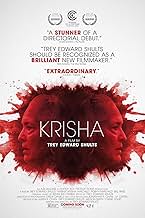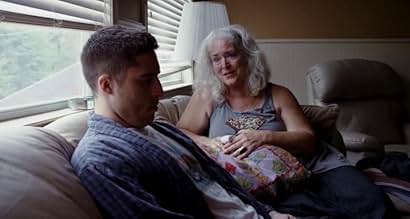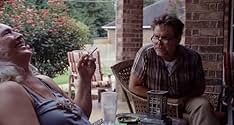Krisha returns for Thanksgiving dinner after ten years away from her family, but past demons threaten to ruin the festivities.Krisha returns for Thanksgiving dinner after ten years away from her family, but past demons threaten to ruin the festivities.Krisha returns for Thanksgiving dinner after ten years away from her family, but past demons threaten to ruin the festivities.
- Awards
- 17 wins & 28 nominations total
- Director
- Writer
- All cast & crew
- Production, box office & more at IMDbPro
Featured reviews
I don't know where that "comedy" label on IMDb comes from. I don't think it functions even as a black comedy. Absolutely heavy and quite dark, but fabulously written, directed, and acted. There are many films that deal with this sort of premise (even Rachel Getting Married comes to mind) but this really took it to another level. Completely immersive, watching it all unravel just hurts to watch. Not an easy viewing by any means and definitely one that will divide audiences completely (even on this board, I can see many people hating it). I loved it though, easily one of the best of the year so far. Krisha Fairchild should absolutely be in contention for end-of-the- year awards, and Trey Edward Shults shows a lot of talent.
Like "La Cienaga", this movie has a veracity and intimacy that will freak out most self- appointed film critics (and I'm not one). If you can't handle domestic pain, tension, and heartbreak then don't watch it. As a big fan of Dostoyevsky I found it riveting and powerful. After viewing I immediately sought out the back story and wasn't surprised to learn the cast/family are actual family members. I don't think a filmmaker could achieve what Shults does with an all-actor cast. It matters not a whit to me that he used family members or that you can foresee an inevitable train wreck in the making toward the end of Act 2. A great film, and the audio effects are superb, especially in the kitchen scene and the use of a Nina Simone track to score Krisha's high flying cookoff.
The unpleasant dynamics and tensions that many families navigate during the holidays can sometimes be downright horrifying. "Krisha," the story of a woman reunited with her family after she estranged herself many years ago in order to face her demons, is a stark reminder of how traumatic confronting the past can be.
Starring his aunt (Krisha Fairchild) and featuring himself and many of his family members, filmmaker Trey Edward Shults has gone extremely personal for his debut feature (based off a short of the same name). The film has a documentary-like feel at times and the family dynamics that play out on screen seem unusually authentic and genuine. Yet underneath it all, Shults works with camera technique and a non-traditional score to remind us how unsettling and difficult this is for his title character.
"Krisha," the film and the character, slowly becomes unhinged over the course of the film. Shults' script smartly denies us the amount of background information we'd like to have; we don't need to know exactly what she's done or what her problems were to be able to observe how frazzled this environment makes her and how confronting these long- ignored but deep-rooted relationships could dismantle her mentally and emotionally.
Shults begins and ends his film with close-ups of Krisha's face giving an indiscernible expression, perhaps with the goal of empathy. Normally we would empathize with the "normal" family members and in many ways we still do, but Shults stays close to Krisha in nearly every moment of the film and gives us piercing access to who she is. Fairchild rises up to meet the challenges that level of intimacy places on an actor. We see Krisha's discomfort and pain, and the sadness when her desire to make things right hits the roadblock of the pain she caused others in the past.
When tension does turn over to drama, the way it plays out feels impressively true to life. Shults clearly plays loose with his script, allowing these unseasoned actors to draw on their own experiences (and perhaps some actual family dynamics) and improvise dialogue. Even if you haven't had a family member melt down in front of everyone, there's a raw truth to the way tense scenes between people play out. That authenticity only makes "Krisha" all the more haunting.
Shults' direction and editing, however, is really the star of this film. He has strong instincts in terms of suspense, creating that slow build and unhinging of his film in the most simple of ways. Even in the most mundane of scenes, he draws forward any tension lurking beneath the surface. He also allows us to see, hear and experience things as the overmedicated mind of Krisha does, yet the techniques are not heavy-handed. He even plays with the chronology of events, weaving together scenes to focus on the emotional arc of the story as it pertains to Krisha rather than feeling beholden to how everything builds up in real time. The result is a much stronger portrait of Krisha and what's truly happening at a deeper level.
Filmmakers that can wield tension and suspense in this way have the skills to tell just about any story well, which bodes well for Shults' career. If he can turn the story of a troubled woman relapsing at Thanksgiving into what you might argue is a horror film that at times verges on Darren Aronofsky's "Requiem for a Dream," the sky's the limit.
~Steven C
Thanks for reading! Visit Movie Muse Reviews for more
Starring his aunt (Krisha Fairchild) and featuring himself and many of his family members, filmmaker Trey Edward Shults has gone extremely personal for his debut feature (based off a short of the same name). The film has a documentary-like feel at times and the family dynamics that play out on screen seem unusually authentic and genuine. Yet underneath it all, Shults works with camera technique and a non-traditional score to remind us how unsettling and difficult this is for his title character.
"Krisha," the film and the character, slowly becomes unhinged over the course of the film. Shults' script smartly denies us the amount of background information we'd like to have; we don't need to know exactly what she's done or what her problems were to be able to observe how frazzled this environment makes her and how confronting these long- ignored but deep-rooted relationships could dismantle her mentally and emotionally.
Shults begins and ends his film with close-ups of Krisha's face giving an indiscernible expression, perhaps with the goal of empathy. Normally we would empathize with the "normal" family members and in many ways we still do, but Shults stays close to Krisha in nearly every moment of the film and gives us piercing access to who she is. Fairchild rises up to meet the challenges that level of intimacy places on an actor. We see Krisha's discomfort and pain, and the sadness when her desire to make things right hits the roadblock of the pain she caused others in the past.
When tension does turn over to drama, the way it plays out feels impressively true to life. Shults clearly plays loose with his script, allowing these unseasoned actors to draw on their own experiences (and perhaps some actual family dynamics) and improvise dialogue. Even if you haven't had a family member melt down in front of everyone, there's a raw truth to the way tense scenes between people play out. That authenticity only makes "Krisha" all the more haunting.
Shults' direction and editing, however, is really the star of this film. He has strong instincts in terms of suspense, creating that slow build and unhinging of his film in the most simple of ways. Even in the most mundane of scenes, he draws forward any tension lurking beneath the surface. He also allows us to see, hear and experience things as the overmedicated mind of Krisha does, yet the techniques are not heavy-handed. He even plays with the chronology of events, weaving together scenes to focus on the emotional arc of the story as it pertains to Krisha rather than feeling beholden to how everything builds up in real time. The result is a much stronger portrait of Krisha and what's truly happening at a deeper level.
Filmmakers that can wield tension and suspense in this way have the skills to tell just about any story well, which bodes well for Shults' career. If he can turn the story of a troubled woman relapsing at Thanksgiving into what you might argue is a horror film that at times verges on Darren Aronofsky's "Requiem for a Dream," the sky's the limit.
~Steven C
Thanks for reading! Visit Movie Muse Reviews for more
Greetings again from the darkness. If we need a poster child for independent film, perhaps this little gem from writer/director Trey Edward Shults should be the leading candidate. The film is daring and raw and proves that even a familiar theme can be interesting if the creative forces are allowed to do what they do best. And on top of that
it was filmed in 9 days with no "stars" and almost no money.
The extended opening shot is a close up of only a woman's face. Her eyes are expressive and her lip begins to quiver. Her look could be described as unnerved, and with the ominous music playing, our mind leads us to believe we are headed towards a horror film. Oh, how right and wrong that initial impression proves to be.
That woman is Krisha (played by Krisha Fairchild), a sixty-something year old who is joining her family for Thanksgiving dinner – after a 10 year absence. Of course, there are no shortage of family holiday dinner disaster movies, but most of the time they are either slapstick comedy or so stagey that the frustration never strikes a chord. Not so with this one.
Tension is palpable in every scene. It's as if everyone is waiting for the proverbial shoe to drop. Krisha is a trainwreck as a mother, sister and person. She is an alcoholic and drug addict, though she proclaims herself healed. It's pretty obvious to everyone (except herself) that her best intentions are not firmly planted in reality and the inevitable is only a matter of time. Old wounds are re-opened (though they were probably never closed), and a simple conversation on the patio or checking the timer for the baking turkey become near catastrophes.
Mr. Shults has economically and effectively cast many of his own family members, and filmed in his mother's home outside of Houston. Krisha is his real life Aunt, and Robyn (who plays Krisha's emotionally devastated sister) is the director's mother. This is a story that works because of the realness of each moment. It feels like family members unloading on each other rather than two actors reciting lines. Krisha's swig of wine in the bathroom provides a moment of relief for both her and the viewer. Having been called "heartbreak incarnate" and an "abandoneer" we even sympathize with her instinct to retreat to the bottle, though it's with dread and misery.
Director Shults displays promise as a director who can capture a personal moment, no matter how awkward or painful. Krisha Fairchild has a Gena Rowlands on screen presence (very high praise) that delivers a touch of grounded realism to her words and actions. As a lover of independent films, here's hoping we see more from them both in the very near future.
The extended opening shot is a close up of only a woman's face. Her eyes are expressive and her lip begins to quiver. Her look could be described as unnerved, and with the ominous music playing, our mind leads us to believe we are headed towards a horror film. Oh, how right and wrong that initial impression proves to be.
That woman is Krisha (played by Krisha Fairchild), a sixty-something year old who is joining her family for Thanksgiving dinner – after a 10 year absence. Of course, there are no shortage of family holiday dinner disaster movies, but most of the time they are either slapstick comedy or so stagey that the frustration never strikes a chord. Not so with this one.
Tension is palpable in every scene. It's as if everyone is waiting for the proverbial shoe to drop. Krisha is a trainwreck as a mother, sister and person. She is an alcoholic and drug addict, though she proclaims herself healed. It's pretty obvious to everyone (except herself) that her best intentions are not firmly planted in reality and the inevitable is only a matter of time. Old wounds are re-opened (though they were probably never closed), and a simple conversation on the patio or checking the timer for the baking turkey become near catastrophes.
Mr. Shults has economically and effectively cast many of his own family members, and filmed in his mother's home outside of Houston. Krisha is his real life Aunt, and Robyn (who plays Krisha's emotionally devastated sister) is the director's mother. This is a story that works because of the realness of each moment. It feels like family members unloading on each other rather than two actors reciting lines. Krisha's swig of wine in the bathroom provides a moment of relief for both her and the viewer. Having been called "heartbreak incarnate" and an "abandoneer" we even sympathize with her instinct to retreat to the bottle, though it's with dread and misery.
Director Shults displays promise as a director who can capture a personal moment, no matter how awkward or painful. Krisha Fairchild has a Gena Rowlands on screen presence (very high praise) that delivers a touch of grounded realism to her words and actions. As a lover of independent films, here's hoping we see more from them both in the very near future.
This movie is a depressing, well-shot trip full of heart-pounding music. The shots are long and flowing, depicting the downward mental spiral of a crazy old woman. I'd call this a thriller. Its worth watching just to experience the mild insanity of this thanksgiving gathering. Mundane scenes in this short slice-of-life story are intensified by an incredible soundtrack. This movie doesn't have much in the way of a plot or script, and is heavily reliant on stunning visuals. This story is a sad one and not for everyone, but if you're interested, then this is worth a watch.
Did you know
- TriviaBillie Fairchild, who plays Grandma in the film, is actually suffering from Alzheimer's Disease, so she was not entirely aware she was acting in a film, although director Trey Edward Shults said she had a wonderful time at the "Thanksgiving."
- ConnectionsFeatured in Human Nature: Creating It Comes at Night (2017)
- SoundtracksJust in Time
Written by Betty Comden, Adolph Green, Jule Styne
Courtesy of Warner Chappell Inc o/b/o Stratford Music Corp.
Performed by Nina Simone
Courtesy of the Estate of Nina Simone and Rich & Famous Records, Ltd.
© 1968, courtesy of Steven Ames Brown
- How long is Krisha?Powered by Alexa
Details
Box office
- Gross US & Canada
- $144,822
- Opening weekend US & Canada
- $9,880
- Mar 20, 2016
- Gross worldwide
- $144,822
- Runtime1 hour 23 minutes
- Color
- Sound mix
- Aspect ratio
- 1.85 : 1
Contribute to this page
Suggest an edit or add missing content

































